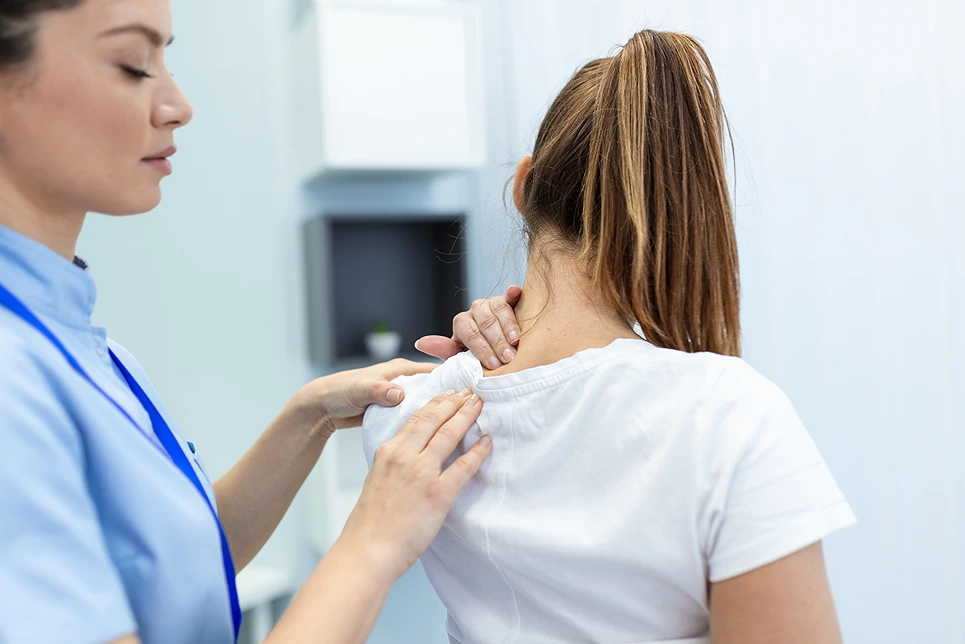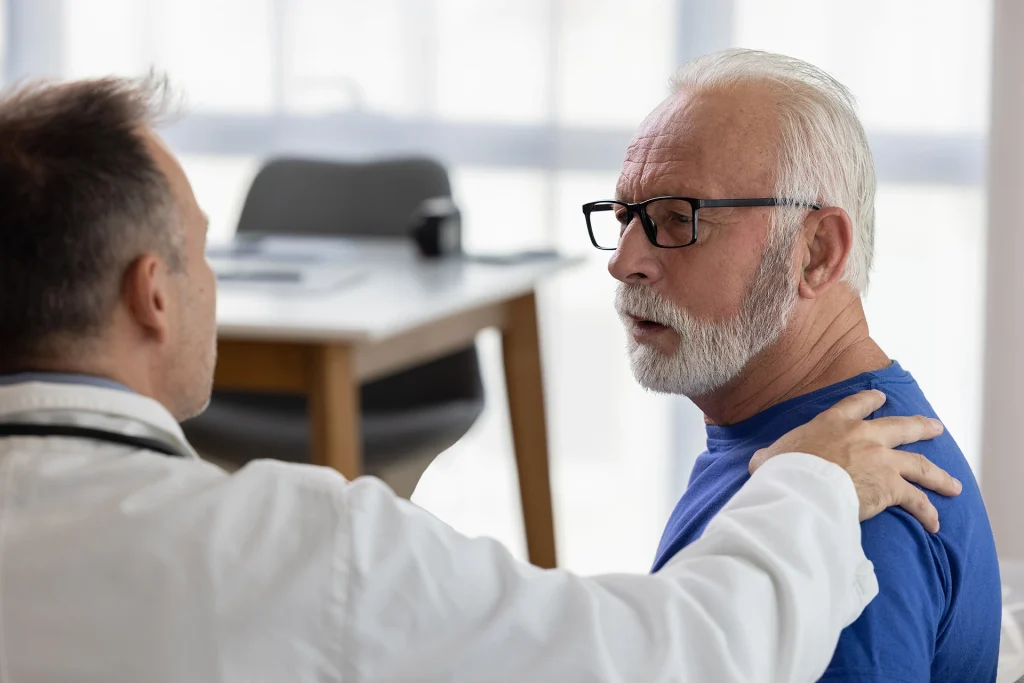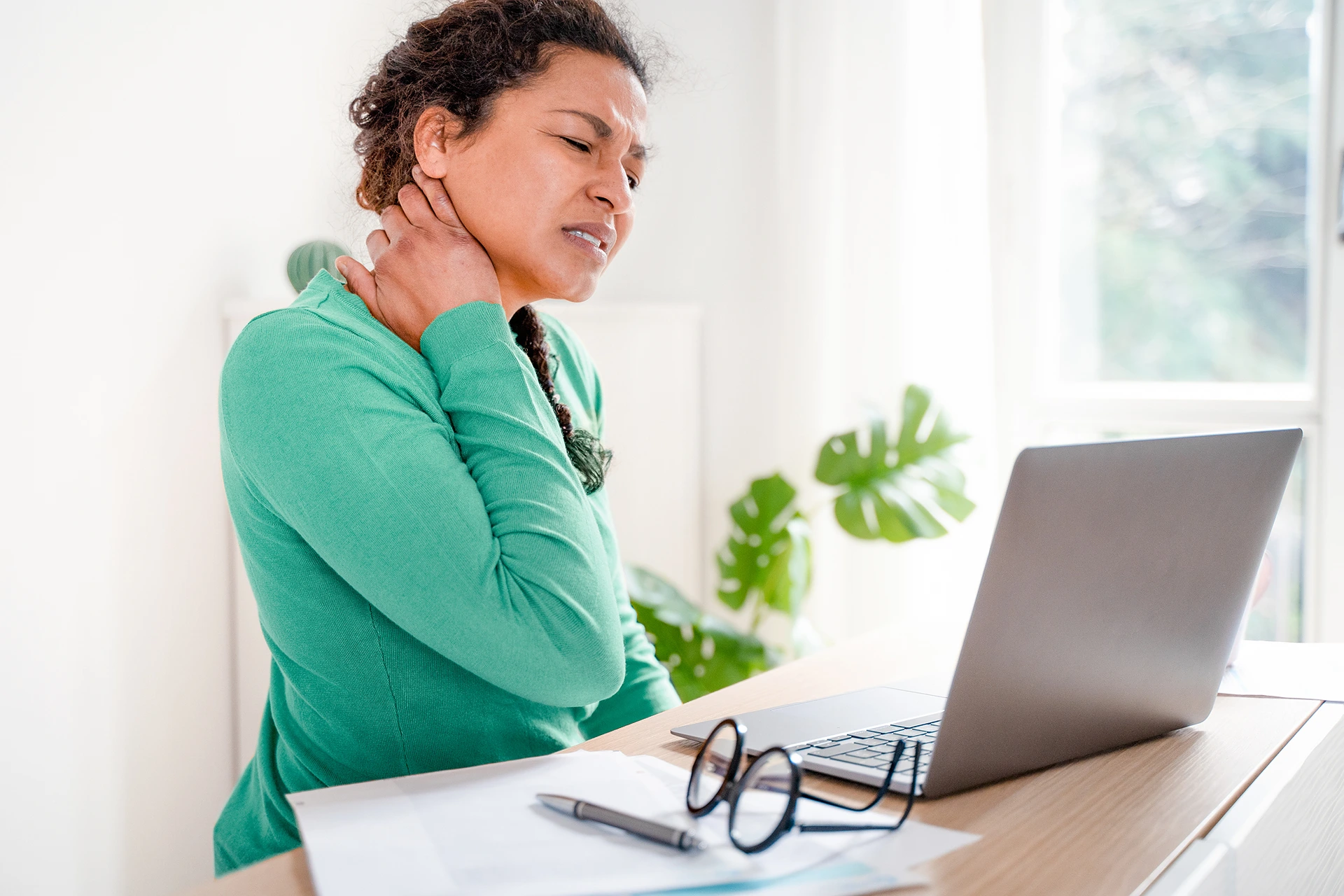Getting vaccinated against COVID-19 is one of the best ways to protect yourself and others from the potentially dangerous symptoms of coronavirus infection.
However, some common side effects can occur as your body builds up immunity. Mild to moderate pain and stiffness in the neck is a frequently reported symptom among vaccine recipients.
If you have experienced neck soreness after getting your COVID-19 shot, you likely have some questions. How long will this neck pain last? What is causing this symptom? Is it a serious issue or a normal reaction?
Fortunately, research indicates that post-vaccination neck pain is usually minor and temporary. But it’s still important to understand what’s behind the soreness, find relief, and know when to seek medical care.
What Triggers Neck Pain After COVID-19 Vaccination?
That stiff, achy feeling in your neck muscles after getting the coronavirus vaccine is most often caused by typical immune responses in the body. Doctors and researchers have identified several key factors that can contribute to this side effect:
Inflammation Near the Injection Site
Some degree of inflammation is expected after any vaccination. With the COVID-19 shots, the vaccine dosage is usually administered high up in the shoulder muscle.
This triggers inflammatory responses in the nearby neck and shoulder muscles as well. As your arm muscle becomes inflamed, it can radiate soreness into the adjacent neck area.
Muscle Pain from the Needle and Ingredients
The needle insertion itself can cause muscle trauma and irritation. In some cases, vaccine ingredients may also contribute to muscular discomfort and tightness. Substances like polyethylene glycol or lipids could potentially trigger pain receptors.
Strain from Vaccine Positioning
How your body is positioned during the vaccination process can factor into neck soreness too.
Reaching forward or having your neck tilted at an awkward angle to expose the shoulder injection site can overstretch muscles. This positioning puts strain on the neck and back that leads to pain afterward.
Swelling of Lymph Nodes
Enlarged lymph nodes are another common reaction to vaccination. There are clusters of lymph nodes located under the neck muscles that often become inflamed. This lymphadenopathy can feel like tender lumps under the skin, causing pain and stiff neck symptoms.
Stress Response and Muscle Tension
Psychological stress is another contributor. Some individuals experience tension in their neck and shoulders due to procedure-related anxiety. The stress response can make muscles clench up. Staying conscious and calm during your vaccination may help minimize this side effect.
In most cases, people experience neck soreness due to a combination of these factors. Understanding what’s provoking the discomfort can help you find the right solutions.
How Long Does Post-Vaccine Neck Pain Usually Last?
If you’re wondering when that persistent neck ache is going to disappear after your vaccination, here’s a look at the typical duration:
| Duration | Description |
| 1-3 Days | Most people have mild to moderate muscle soreness in the neck and shoulder that resolves within a few days. This temporary pain is considered a normal and non-serious reaction. |
| 1 Week | In some individuals, post-injection neck pain lingers for up to a week before fully going away. Swelling and inflammation can persist, especially if lymph nodes are involved. |
| 2-4 Weeks | With enlarged lymph nodes, it can take up to a month for the neck tenderness and lump feeling to completely subside. This reaction should still gradually improve over time. |
| Beyond 4 Weeks | Severe or long-lasting neck pain that continues for more than a month after vaccination is very rare. At this point, the symptom likely requires medical |
For quick-dissipating soreness, home treatment measures can help provide relief. But if neck pain becomes severe or debilitating, contact your doctor promptly. Extended inflammation or unexplained symptoms need proper diagnosis.
How Severe Is Neck Pain After COVID-19 Shots?
Post-vaccine neck pain can vary from mild muscle aches to more intense and debilitating discomfort that restricts neck mobility. Here’s an overview of the scope:
- Mild: Dull muscle soreness and minor stiffness near the injection site that is manageable. Daily activities are not significantly impacted.
- Moderate: More pronounced pain with certain neck movements that may limit mobility somewhat. Sleep may be briefly affected.
- Severe: Sharp, acute pain that radiates widely. Extreme stiffness and swelling that severely limits range of motion in the neck. Unable to perform normal activities due to intense, persistent pain.
It’s important to note that the vast majority of vaccine recipients experience only minor to moderate neck soreness that passes quickly. But for unlucky few with severe symptoms, prompt medical care is key.
Differentiating Neck Pain from Other Concerning Symptoms
While neck pain is a common side effect of COVID-19 vaccination, it’s important to distinguish normal soreness from more severe symptoms requiring medical care.
Muscle aches tend to be localized around the injection site and feel stiff or tender when turning the neck. Rare but serious issues like vaccine-induced thrombosis or cervical radiculopathy often present differently:
- Blood clots may cause sudden, acute neck pain along with shortness of breath, chest pain, or leg swelling. The sensation tends to be sharp and severe rather than just muscle soreness.
- Nerve damage affecting the cervical spine can cause shooting pain or numbness radiating down the arms and hands. This is accompanied by muscle weakness versus just stiffness.
Most post-vaccination soreness around the injection site and nearby lymph nodes is mild, but new neurological deficits, breathing issues, or intense pain need prompt medical assessment. Don’t hesitate to contact your doctor if the symptoms seem unusual.
Warning Signs to Seek Medical Care for Neck Pain

In most cases, post-vaccine neck discomfort will fade after a few days of self-care. But with any worrying symptoms, it’s smart to seek expert guidance for evaluation and proper treatment. Contact your doctor promptly if you experience:
- Severe or worsening pain that persists beyond one week
- Inability to move or turn your neck without significant pain
- Muscle weakness, numbness or reduced mobility in neck and shoulders
- Severe headache or dizziness accompanying neck pain
- Swelling, redness, discharge or warmth around the injection site
- Lumps or enlarged lymph nodes that do not diminish
- Fevers, chills or other signs of illness along with neck pain
Don’t hesitate to call your physician or seek emergency care if side effects seem abnormal or become very severe. Though extremely rare, some serious conditions like vaccine-induced thrombosis can initially resemble muscular soreness.
Experiencing long-lasting, debilitating neck symptoms warrants prompt medical assessment to identify the underlying cause. Better safe than sorry!
Coping with Neck Pain in Daily Life After COVID-19 Vaccination
It’s normal to experience some neck stiffness and soreness after getting your COVID-19 shot, but this can temporarily disrupt normal activities. To help manage:
- Avoid sudden neck twisting or straining movements that aggravate pain when reaching or looking sideways.
- Maintain proper posture when sitting at a desk or computer working, with neck and shoulders relaxed.
- Use an ergonomic pillow or neck brace if sleeping is disrupted by vaccine-related neck ache.
- Take regular stretching breaks during prolonged tasks to relieve muscle tension.
- Adjust work duties that involve heavy lifting or prolonged overhead motions until neck pain subsides.
- Try relaxation techniques like gentle neck stretches or massages to ease muscle tightness and spasms.
- Keep pain medication handy if neck pain flares up when concentrating or performing daily tasks.
Though inconvenient, the vaccine-related neck discomfort is usually mild and temporary. With some adjustments and proper care, daily life can proceed while avoiding exacerbating the soreness as it resolves.
Long-Term Outcomes for Neck Pain After COVID-19 Vaccination
While most post-vaccination neck pain fully resolves within a week, some long-lasting stiffness, swelling, or ache can occasionally occur even months later according to emerging research. Potential contributors include:
- Extended lymph node inflammation near the injection site pressing on neck tissues
- Development of vaccine-induced fibromyalgia or chronic pain syndrome
- Underlying cervical spine pathology like degenerative disc disease aggravated by vaccine positioning
- Psychological factors like anxiety about side effects prolonging muscle tension
Fortunately, rates of persistent neck issues after COVID-19 vaccination are very low. Non-surgical treatments like physical therapy, massage, nerve blocks, chiropractic care, and pain management are usually effective for long-term resolution.
Staying Informed and Connecting with the Right Care for Neck Pain

Neck soreness and stiffness are expected side effects after COVID-19 vaccination for many people.
If neck pain after your vaccine shot becomes severe or persists longer than expected, don’t hesitate to consult your healthcare provider. With their guidance, you can determine if further treatment is needed for proper healing. Resources like Kaly make it easy to connect with knowledgeable doctors who can evaluate your symptoms, provide personalized care recommendations, and give you peace of mind.
By using all the tools available, from self-care tips to professional medical advice, you can overcome vaccine side effects confidently. Visit Kaly today to find the right doctor to help manage post-vaccination neck pain and get you comfortably back to your routine.
